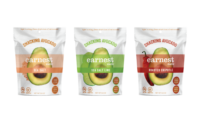Mindless Snacking
According to an Australian study, women who snack while watching TV tend to eat more at a later time, says executive editor Marina Mayer. In fact, “snacksperts” are calling it “mindless eating.”

When it comes to food, it seems as though it’s the same story, different day. One day, bread is a necessary avenue for consumers to obtain their recommended serving size of whole grains and fiber, but the next day, it’s labeled unhealthy because of its high carbohydrate content.
One day, popcorn is light, fluffy and healthy-the next day, scientists and researchers are concerned about the chemicals found in the butter flavoring (Diacetyl, a chemical used in butter flavoring, may damage the lungs by reacting and forming complexes with amino acids in cell membranes, according to RTI International and the National Institute of Environmental Health Sciences, both located in Research Triangle Park, N.C.).
Now, so-called “snacksperts” are attacking how consumers snack, stating that Americans are advised to avoid snacking while watching TV because it will only cause them to eat more later.
I guess that means me devouring a box of Little Debbie’s while watching The Biggest Loser presents more side effects than just guilt?
According to the study conducted by Australian researchers, snacking while watching TV forces people to “forget” how much they’ve actually eaten, and therefore they feel as though they need to eat again shortly after the TV program ends. However, the study only targets females, as the male study group didn’t present “enriching” results (glad to know that us women continue to dazzle these "snacksperts").
The study involved two experiments. In the first study, 16 healthy-weight women were invited to eat chocolate, potato chips and other snack items while watching an episode of Friends or Seinfeld, (my invitation must have gotten lost in the mail), whereas the other half snacked while sitting quietly. Both groups were given 20 minutes to consume as many snacks as they wanted, the study says.
In study two, 84 women followed the same steps as the previous group, however, they were broken up into segments and made to watch different genres of TV, i.e., boring, sad and funny.
The findings show similar results-the TV-while-snacking group tended to consume more food later than the sitting-quietly-while-eating bunch. In addition, the study states that the type of show didn’t augment the results, proving that it doesn’t matter what type of TV is being viewed, it’s just the distraction of watching TV that creates this “must-eat-more-later” syndrome.
“Eating is a very complex behavior,” says David Lau, professor of medicine at the University of Calgary and president of Obesity Canada, an obesity awareness group. “[When people snack in front of the TV], their minds are off. It’s really mindless eating.”
What does this mean then for those of us who snack at our desks or munch in the car while sitting in never-ending traffic? Thanks to our fast-paced, always-on-the-go society and the assortment of snacks designed for on-the-go consumers, we are forced to conduct “mindless eating” because we’re constantly distracted.
So what gives? Are we really hurting ourselves in the long run by going, going, going or does it help to invest in better-for-you snack items so that the “mindless eating” isn’t so bad?
Either way, these "snacksperts" have another thing coming to them if they think I’m going to give up my snacking-while-watching-TV habit. Sometimes I just can’t resist a bowl of popcorn while succumbing to an hour of Jersey Shore. Then again, many of today’s TV programs deliver what I call “mindless viewing.”
Who’s bringing the snacks?

When it comes to food, it seems as though it’s the same story, different day. One day, bread is a necessary avenue for consumers to obtain their recommended serving size of whole grains and fiber, but the next day, it’s labeled unhealthy because of its high carbohydrate content.
One day, popcorn is light, fluffy and healthy-the next day, scientists and researchers are concerned about the chemicals found in the butter flavoring (Diacetyl, a chemical used in butter flavoring, may damage the lungs by reacting and forming complexes with amino acids in cell membranes, according to RTI International and the National Institute of Environmental Health Sciences, both located in Research Triangle Park, N.C.).
Now, so-called “snacksperts” are attacking how consumers snack, stating that Americans are advised to avoid snacking while watching TV because it will only cause them to eat more later.
I guess that means me devouring a box of Little Debbie’s while watching The Biggest Loser presents more side effects than just guilt?
According to the study conducted by Australian researchers, snacking while watching TV forces people to “forget” how much they’ve actually eaten, and therefore they feel as though they need to eat again shortly after the TV program ends. However, the study only targets females, as the male study group didn’t present “enriching” results (glad to know that us women continue to dazzle these "snacksperts").
The study involved two experiments. In the first study, 16 healthy-weight women were invited to eat chocolate, potato chips and other snack items while watching an episode of Friends or Seinfeld, (my invitation must have gotten lost in the mail), whereas the other half snacked while sitting quietly. Both groups were given 20 minutes to consume as many snacks as they wanted, the study says.
In study two, 84 women followed the same steps as the previous group, however, they were broken up into segments and made to watch different genres of TV, i.e., boring, sad and funny.
The findings show similar results-the TV-while-snacking group tended to consume more food later than the sitting-quietly-while-eating bunch. In addition, the study states that the type of show didn’t augment the results, proving that it doesn’t matter what type of TV is being viewed, it’s just the distraction of watching TV that creates this “must-eat-more-later” syndrome.
“Eating is a very complex behavior,” says David Lau, professor of medicine at the University of Calgary and president of Obesity Canada, an obesity awareness group. “[When people snack in front of the TV], their minds are off. It’s really mindless eating.”
What does this mean then for those of us who snack at our desks or munch in the car while sitting in never-ending traffic? Thanks to our fast-paced, always-on-the-go society and the assortment of snacks designed for on-the-go consumers, we are forced to conduct “mindless eating” because we’re constantly distracted.
So what gives? Are we really hurting ourselves in the long run by going, going, going or does it help to invest in better-for-you snack items so that the “mindless eating” isn’t so bad?
Either way, these "snacksperts" have another thing coming to them if they think I’m going to give up my snacking-while-watching-TV habit. Sometimes I just can’t resist a bowl of popcorn while succumbing to an hour of Jersey Shore. Then again, many of today’s TV programs deliver what I call “mindless viewing.”
Who’s bringing the snacks?
Looking for a reprint of this article?
From high-res PDFs to custom plaques, order your copy today!








